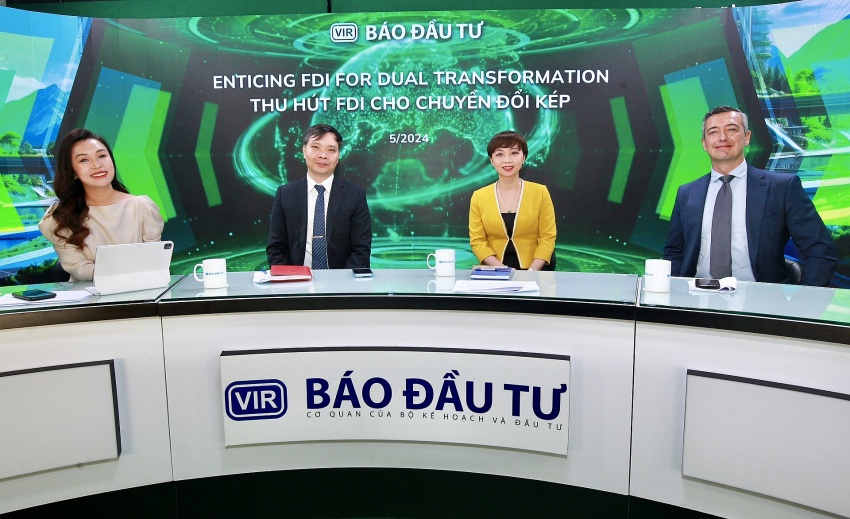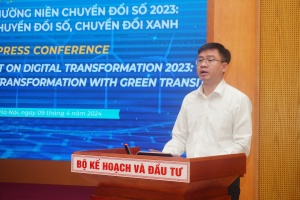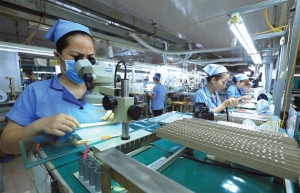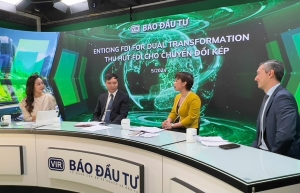Enticing FDI legal framework for dual transformation
This message was shared by Do Van Su, deputy general director of the Foreign Investment Agency (FIA) under the Ministry of Planning and Investment, at the “Enticing FDI for Dual Transformation” talk show organised by VIR on May 22.
The fact that Vietnam is taking the lead in ensuring sustainable development is evident through its implementation of a national green growth strategy, a climate change strategy, and a new environmental protection law. Additionally, obtaining feedback from businesses operating in Vietnam provides a valuable perspective on these initiatives.
 |
| Do Van Su, deputy general director of the Foreign Investment Agency under the Ministry of Planning and Investment (second from the left) |
The FIA's role is to promote foreign-invested projects in Vietnam. From a policy standpoint, and crucially for the legal framework governing businesses and investors in Vietnam, there are three key legal documents directly related to green transformation.
The first document is the national green growth strategy. This strategy outlines a path for sustainable economic growth by focusing on reducing greenhouse gas emissions, improving energy efficiency, and fostering green industries. It serves as a comprehensive blueprint for transitioning to a low-carbon economy and enhancing environmental sustainability.
Secondly, the Vietnam Climate Change Strategy is a comprehensive plan that emphasises measures to protect coastal areas, manage natural resources, and develop renewable energy sources. Given that Vietnam has numerous coastal areas significantly affected by climate change, this strategy addresses critical issues such as coastal erosion, rising sea levels, and the sustainable use of marine resources.
The third crucial legal framework is the adoption of the new Environmental Protection Law. This law strengthens regulations on environmental impact assessments, pollution control, and biodiversity compensation. It aims to enhance legal mechanisms for protecting the environment, ensuring that economic development does not come at the expense of the environment.
Vietnam is strategically located at the centre of Southeast Asia and adjacent to China, which positions it advantageously within a direct supply chain to the world's largest market for both export and import materials essential for production. As of now, Vietnam has 15 free trade agreements (FTAs) in effect, significantly expanding the global market reach for Vietnamese products. This advantageous position has attracted numerous major global companies to establish factories, branch offices, and subsidiaries in Vietnam to leverage the country's production capabilities.
In terms of skilled labour, Vietnam benefits from partnerships between some of the world's leading universities and local colleges and universities. These collaborations are focused on training young workers for high-tech sectors, ensuring a steady supply of qualified labour to meet the demands of advanced industries. Additionally, the Vietnamese government provides robust support and incentives for high-tech projects. The FIA is currently developing new decrees and policies to further bolster this sector, creating an even more favourable environment for technological investments.
However, there are certain challenges that investors face when operating in Vietnam, particularly concerning the stability of the electric power supply. Last year, several investors expressed concerns to the Ministry of Planning and Investment (MPI) about the inconsistent power supply affecting their manufacturing operations. Recognising these difficulties, comprehensive efforts are being made to address them. The MPI minister has instructed Vietnam Electricity (EVN) and other related companies to ensure a stable power supply for foreign investment companies, especially during the peak summer months.
To prepare for the influx of FDI in green and digital transformation, the Vietnamese government, through the MPI, has proposed to the prime minister new FDI strategies. These comprehensive strategies focus on five key sectors that aim to attract and promote foreign investment in high technology projects, renewable energy, smart manufacturing, green infrastructure, and digital transformation.
The second crucial step for Vietnam is to strengthen its regulatory and legal framework, particularly administrative procedures. The goal is to simplify the process for foreign investors to set up companies and implement their production operations in Vietnam, making the business environment more accessible and efficient.
Additionally, promoting innovation and technology transfer within local companies is vital. This initiative will empower local businesses, enabling them to cooperate more effectively with foreign companies and enhance their competitiveness.
Lastly, Vietnam must focus on developing its infrastructure and training skilled labour to support these advanced sectors. However, the most important challenge is to implement these policies effectively and ensure that the legal framework operates efficiently. This includes translating strategic plans into actionable steps that yield tangible results, thereby creating a robust and supportive environment for sustainable and digital growth.
 | Driving dual transformation Vietnam's Ministry of Planning and Investment and the German International Cooperation Agency (GIZ) have released a report titled “Business digital transformation 2023: Digital Transformation, Green Transformation”. |
 | Groundwork laid for the dual transition Vietnam’s strategic focus on attracting high-quality foreign investment is being demonstrated through its emphasis on green and digital transformation projects, supported by robust legal frameworks and a strong commitment to sustainability and technological innovation. |
 | VIR talkshow on the green-digital dual transition At the VIR talkshow “Enticing FDI for Dual Transformation,” speakers discussed the factors needed to create a stable and effective FDI environment. |
What the stars mean:
★ Poor ★ ★ Promising ★★★ Good ★★★★ Very good ★★★★★ Exceptional
Related Contents
Latest News
More News
- Vietnam, New Zealand seek level-up in ties (February 19, 2026 | 18:06)
- Untapped potential in relations with Indonesia (February 19, 2026 | 17:56)
- German strengths match Vietnamese aspirations (February 19, 2026 | 17:40)
- Kim Long Motor and AOJ Suzhou enter strategic partnership (February 16, 2026 | 13:27)
- Haiphong welcomes long-term Euro investment (February 16, 2026 | 11:31)
- VIFC in Ho Chi Minh City officially launches (February 12, 2026 | 09:00)
- Norfund invests $4 million in Vietnam plastics recycling (February 11, 2026 | 11:51)
- Marico buys 75 per cent of Vietnam skincare startup Skinetiq (February 10, 2026 | 14:44)
- SCIC general director meets with Oman Investment Authority (February 10, 2026 | 14:14)
- G42 and Vietnamese consortium to build national AI infrastructure (February 09, 2026 | 17:32)

 Tag:
Tag:




















 Mobile Version
Mobile Version